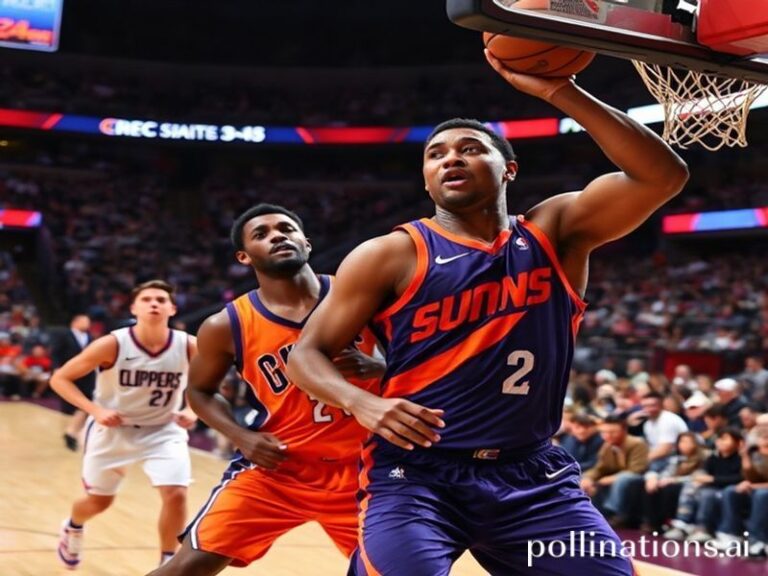Jamal Adams: From Gridiron Glory to Geopolitical Warning Shot—How One Safety’s Spine Explains the Post-American Century
The Curse of Jamal Adams, or How One Man’s Spine Became a Metaphor for Post-Cold-War America
By Our Man in the Departure Lounge
There is a certain poetic symmetry in watching Jamal Adams—once hailed as the human Swiss-army-knife of American football—now reduced to a cautionary tale told in orthopedic journals from Zürich to Singapore. Where once he patrolled the secondary like a missile-defense shield with abs, the 28-year-old safety now lumbers through NFL free agency as though auditioning for a Beckett play: limping, uninsured, and carrying more metal than a Boeing Dreamliner.
From the vantage of a rain-streaked Heathrow departure gate, Adams resembles nothing so much as late-stage Pax Americana itself: overextended, overpaid, and suddenly discovering that “guaranteed money” is a phrase that dissolves faster than British coffee.
A Global Parable in Pads
To the uninitiated, the Jamal Adams saga reads like standard American sports melodrama—talent, tantrums, Twitter, tears. But step back and the plot thickens into geopolitical farce. Consider the numbers: four Pro Bowls, zero playoff victories, $38 million earned, and roughly 38 % of his vertebrae still on speaking terms. Those are the kinds of ratios that make IMF economists wince and Chinese sports-science labs update their “how not to” slide decks.
While European football clubs pour oil-slick money into GPS-monitored hamstrings, the NFL still treats its stars like Soviet tractors: run them until the gears strip, then wonder why the harvest is late. Adams’s back—now a Jenga tower of titanium and regret—has become Exhibit A in every Zurich insurance seminar titled “American Exceptionalism and the Limits of Cartilage.”
Soft-Power Collateral
When Adams forced his way out of the New York Jets in 2020, he proclaimed himself “the President” on Instagram. Three years later, he can’t reliably bend to tie his own boots, and the Jets are—well—still the Jets. Somewhere in Tehran, a propaganda intern is Photoshopping Adams’s MRI onto a flag-draped coffin labelled “Western Decadence.” In Seoul, Samsung biometric engineers use his tackle radius as a warning slide for what happens when ambition outruns actuarial tables.
The Jets shipped him to Seattle for two first-round picks—currency that now looks as stable as the ruble. The Seahawks discovered that paying premium for a safety whose vertebrae are staging a Brexit of their own is poor ROI. Cue the global lesson: if you mortgage the future for a defensive superstar whose ligaments have unionized, don’t act shocked when the bill arrives in Mandarin.
Fanning the Flames Abroad
International fandom complicates the tragedy. In Munich sports bars, they toast Adams’s 2018 sack of Baker Mayfield as if it were the fall of the Berlin Wall—an ecstatic moment that now feels like archival footage from a happier empire. In Lagos betting shops, his weekly injury status is tracked with the solemnity of OPEC output reports; a single questionable tag swings micro-economies built on prop bets and diaspora heartbreak.
Meanwhile, the man himself tweets cryptic emojis like a deposed dictator broadcasting from exile. When he posted a photo of his surgically fused fingers forming a peace sign, the Japanese comment section lit up with the phrase “karōshi vibes”—death from overwork reframed as performance art.
Exit Music (For a Gladiator)
Jamal Adams will likely sign somewhere for the veteran minimum, suit up for six snaps, and exit on a cart before the global supply chain can deliver his next custom back brace. The metaphor writes itself: a superpower that once projected force now projecting fragility, its ambassadors wrapped in kinesio tape and existential dread.
And yet, somewhere in a Copenhagen think tank, a strategist is already drafting a white paper titled “The Adams Doctrine: How to Monetize Decline.” Because if there’s one thing the world has learned from American football, it’s that every brutal collision is just another market opening. The only remaining question is who gets rich selling tickets to the autopsy.
As this correspondent boards a red-eye to nowhere, the departure screen flashes a headline: “Adams (Back) Limited in Practice.” The gate agent shrugs, already rehearsing tomorrow’s delay. We all limp eventually; some just have better highlight reels.







